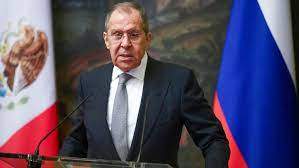Russian minister: US-Russia ties worse than during Cold War

MOSCOW -- Russia's top diplomat said Wednesday that relations with the United States are now even worse than during Cold War times because of a lack of mutual respect.
Russian Foreign Minister Sergey Lavrov said Moscow stands ready to normalize ties with Washington but that the U.S. should stop posturing like a “sovereign” while rallying its allies against Russia and China.
Lavrov said if the U.S. shuns a mutually respectful dialogue on the basis of a balance of interests, “we would live in conditions of a Cold War or worse."
“During the Cold War, the tensions were flying high, and risky crisis situations often emerged, but there was also a mutual respect,” Lavrov said in a Russian state television interview. “It seems to me there is a deficit of it now.”
Earlier this month, the Biden administration slapped Russia with sanctions for interfering in the 2020 U.S. presidential election and for involvement in the SolarWind hack of federal agencies — activities Moscow has denied.
The U.S. ordered 10 Russian diplomats expelled, targeted dozens of companies and people and imposed new curbs on Russia’s ability to borrow money. While ordering the sanctions, U.S. President Joe Biden also called for de-escalating tensions and held the door open for cooperation with Russia in certain areas.
Russia quickly retaliated by ordering 10 U.S. diplomats to leave, blacklisting eight current and former U.S. officials and tightening requirements for U.S. Embassy operations.
As part of the restrictions, Russia moved to ban the U.S. Embassy and its consulates from hiring Russian citizens and third country nationals. Similar bans would also be applied to other nations designated as “unfriendly.”
Lavrov said Wednesday that a list of those countries will be published soon to formalize the decision.
Speaking in the interview with a Russian state TV host, Lavrov noted that Moscow has had a “positive” attitude to Biden’s proposal to hold a summit with Russian President Vladimir Putin, but added that Russia still needs to analyze all aspects of the initiative.
Lavrov said he would attend a meeting of top diplomats of the Arctic nations in Iceland set for next month and would be ready to meet with U.S. Secretary of State Antony Blinken if he also joins the meeting.
Photo: Russian Foreign Minister Sergey Lavrov speaks during a joint news conference with Mexican Foreign Minister Marcelo Ebrard following their talks in Moscow, Russia, on April 28, 2021. (Russian Foreign Ministry Press Service via AP)
Link: https://abcnews.go.com/International/wireStory/russian-fm-us-russia-ties-worse-cold-war-77362821




